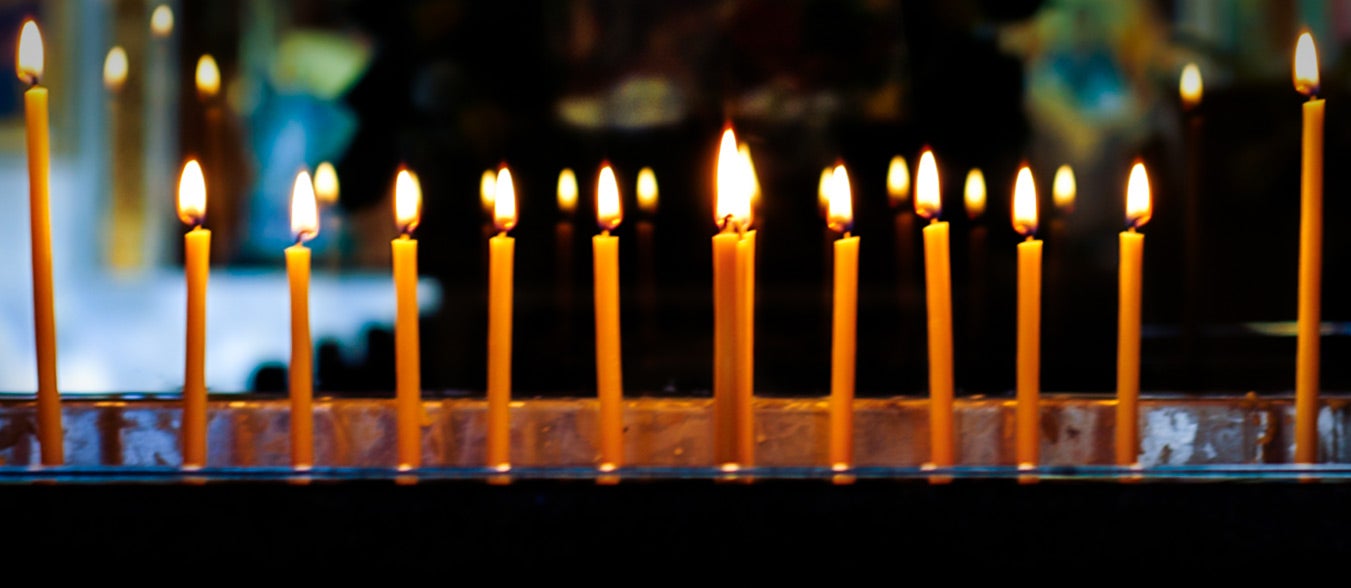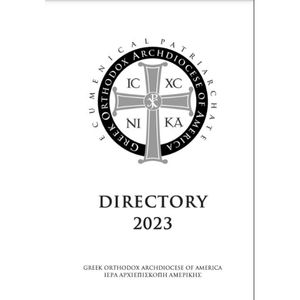Christ is in our midst! He is and ever shall be!
Our services are streamed live on the internet.
at our Saint Catherine website - www.stcatherine-wpb.org
Join us for Orthodox Divine Liturgy every Sunday at 9:45 a.m.

Light a candle and offer a prayer at Saint Catherine (click above). The online form sends the names of your family and friends direct to Father Andrew at the altar; prayers are offered during the Proskomidi in preparation for the Divine Liturgy!
COVID-19 protocol: Parishioners and guests may wear a mask if they desire in our Church and Hellenic Cultural Center. All are advised not to enter if exhibiting COVID-19 symptoms. Everyone should also follow the CDC guidelines on quarantining if they have recently been with someone who is COVID positive or experiencing symptoms.
Links to the service text: Links to the service texts are through the Digital Chant Stand of our Archdiocese. For optimal viewing select the "GR-EN Text/Music" link for Matins (Orthros) and Divine Liturgy. Apps may be downloaded for your phone or tablet. Link to the Digital Chant Stand
Holy Communion: When the faithful approach the Holy Chalice, they should stand with respect before the priest and say their baptismal/chrismation name. After the name is uttered, the faithful should open their mouth to receive Holy Communion. When the spoon goes into the mouth, the faithful should close their mouth and make sure that they swallow the consecrated Bread and Wine. Every person who stands before the Holy Chalice, should not have any contact with the red communion cloth, before, during, or after receiving Holy Communion. The red communion cloth is to be placed under each person’s chin by those who are assisting the clergy. Under no circumstances should the red communion cloth be used as a table napkin to wipe the mouth, nor should one who has received Holy Communion touch it at all.
Coffee and Fellowship: We invite you to join us for the Philoptochos Vasilopita Sunday Reception benefiting Saint Basil Academy in our Hellenic Cultural Center after the Divine Liturgy.
____________
This Week
Sunday, January 21 12th Sunday of Luke
8:30 am Orthros
9:45 am Divine Liturgy
Philoptochos Vasilopita Sunday
benefiting Saint Basil Academy
Tuesday, January 23
10:00 am Mommy & Me
Wednesday, January 24
7:00 pm Bible Study
Thursday, January 25
7:00 pm Parish Council Meeting
Next Week and Highlights of Upcoming Services and Events
Sunday, January 28 15th Sunday of Luke
8:30 am Orthros
9:45 am Divine Liturgy
Book Club (1st Meeting) in the Small Hall after the Divine Liturgy
Tuesday, January 30 The Three Hierarchs
9:00 am Orthros
10:00 am Liturgy
10:00 am Philoptochos Baking
Wednesday, January 31
10:30 am Pan Orthodox Clergy Meeting
7:00 pm Discover Orthodoxy
Friday, February 2 Presentation of the Lord in the Temple
9:00 am Orthros
10:00 am Liturgy
Tuesday, February 6
Philoptochos Festival Baking
Friday - Sunday, February 16 - 18
Saint Catherine Annual Greek Festival
Tuesday, February 27
Philoptochos February Meeting
Stewardship: We appreciate our stewards – our Saint Catherine family. Your Stewardship gift reflects your appreciation for God's many blessings. As of January 7th, stewardship gifts for 2023 have been received from 286 individuals/families totaling $229,554. A great thank you to our 2023 stewards. Your offering was fantastic!
As of January 7th, Stewardship gifts for 2024 have been received from 28 individuals/families totaling $14,020. Some of the donations represent fulfillment of their total pledge while many others have begun their weekly, monthly or other scheduled donation. We are so thankful to these stewards.
The 2024 Stewardship materials were mailed to our parishioners and are also available on the website. Click here for the 2024 Stewardship Program and Commitment Form. New feature for 2024 - You may complete the commitment form online and email it back to the office.
The Donate buttons here and on our website lead to our online giving site. Again, thank you for your support!
Youth Safety Resources: We’re committed to connecting young people with Jesus Christ. To do that, we need to create ministry environments that are safe and health. For more on how you can help, please visit our Youth Safety website: goarch.org/safety.
Church Services Streamed: Many of our Divine Liturgies have been recorded and can be viewed at www.youtube.com. Subscribe to our YouTube channel; you will be notified when we begin a live stream.
Saint Catherine Greek Orthodox Church (Services from 2020 until now)
Saint Catherine Greek Orthodox Church (Selected services from 2015-2019)










 may be downloaded as a pdf and used as a digital book on tablets, smart phones and other devices.
may be downloaded as a pdf and used as a digital book on tablets, smart phones and other devices.